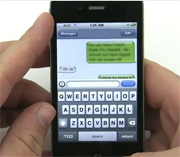
FRIDAY, March 15 (HealthDay News) — Mistakes in text messages often make people laugh out loud, but it might not always be a laughing matter. Garbled text messages may be a sign that someone has suffered a stroke, even in people who have no problem speaking, according to researchers.
The case study by a team at Henry Ford Hospital describes a 40-year-old man who was visiting Detroit and during the night began sending incoherent text messages to his wife.
At the hospital the next day, the man had no difficulty with the traditional bedside evaluation of language abilities and doctors found no visible neurological problems except a slight weakness on the right side of his face.
The doctors then gave the man a smartphone and asked him to text “the doctor needs a new Blackberry.” Instead, he texted “Tjhe Doctor nddds a new bb.” When he was asked if this was correct, the man did not recognize any errors.
The doctors eventually determined that the man had suffered an ischemic stroke, in which a clot or other blockage cuts off blood supply to part of the brain. Such strokes usually lead to some form of physical disability and can be fatal, the study authors noted in a Henry Ford Health System news release.
The study is scheduled for presentation March 19 at a meeting of the American Academy of Neurology, in San Diego.
The findings suggest that “dystextia” — a term for incoherent text messaging — may be a sign of stroke in patients who show no other clear symptoms, the researchers said.
“Text messaging is a common form of communication with more than 75 billion texts sent each month,” study lead author and neurologist Dr. Omran Kaskar said in the news release. “Besides the time-honored tests we use to determine aphasia in diagnosing stroke, checking for dystextia may well become a vital tool in making such a determination.”
Aphasia is a partial or total inability to form or understand language.
“Because text messages are always time-stamped when they’re sent, they may also help establish when the stroke symptoms were at least present or even when they began,” which plays a key role in determining treatment, Kaskar added.
The data and conclusions of research presented at medical meetings should be viewed as preliminary until published in a peer-reviewed journal.
More information
The U.S. National Institute of Neurological Disorders and Stroke has more about stroke.

